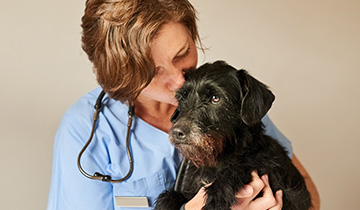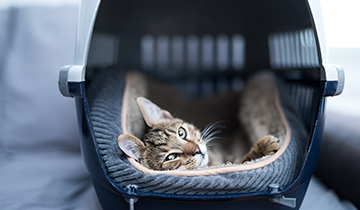What pet owners should have in case of emergencies
The last thing that any pet owner wants to think about is when things go wrong, but it’s important to be prepared with a few basics – pet insurance, a pet first aid kit and a disaster kit – should the unexpected happen.
If something was to happen, it’s important to stay as calm as possible and know a few first aid tips before anything happens. If it is an injury or your pet has eaten something they shouldn’t have – always call your vet to make sure you are doing the right thing by your pet, but having a pet first aid kit will be handy to make their journey to the vet more comfortable. Should there be a natural disaster, having their grab and go bag set up right next to yours will also mean that you can get up and go quickly – getting your whole family out safely if needed.
Pet first aid kit for cats and dogs
Your household first aid kit may contain many of the items you’ll want to have in your pet first aid kit, with a few differences. First aid is intended to be the first step in helping your pet. If your pet is sick or injured, contact your vet as soon as possible. You may wish to take a pet first aid course to learn more about what to do in a pet health emergency.
We’ve included a list of items for a pet first aid kit below
Pet first aid essentials
- Gauze roll (50mm width roll or pads)
- Material to make a splint (self-adherent, elastic support wrap)
- Non-stick bandages (sticky ones don’t work well with fur)
- Adhesive tape
- Scissors to cut bandages, etc
- Old clean towels, big enough to wrap your pet in or cover your car seat when you take them to the vet
- Latex gloves to protect yourself if your pet is injured or has potentially eaten something poisonous
- Tweezers
- Sterile saline
- Swabs
- A foil blanket (for warmth in case of shock)
- A small syringe (handy for giving fluids in case of dehydration and for flushing out wounds)
- A head torch or flashlight
- List of emergency numbers, including your pet’s vet and an after-hours emergency vet clinic or pet hospital
- List of important information about your pet (for example, allergies, vaccinations and veterinary history, registration and microchip information) to remind you of important things to tell your vet and to help anyone caring for your pet in your absence.
Pet carriers and containers
You’ll need something to securely transport your pet to the vet or to a safe place during a natural disaster. It’s a good idea to check that your pet is microchipped and that your details are up to date on the up-to-date on the Companion Animals NZ Register.
- Soft muzzle, collar and leash (dogs)
- Carrier basket/cage (cats)
Pet survival kit for emergencies and disasters
Civil Defence NZ encourages us all to have a grab and go bag should there be an emergency or natural disaster that strikes, but what about our pets? Have you got their grab and go bag sorted?
This emergency kit is designed to help you support and care for your pet in the case of a disaster. This could be a ‘grab-bag’ or container to easily pack and carry your pet’s essentials in the event you need to leave your home quickly that includes:
- A pet first aid kit
- Your pet’s medication – at least five days’ supply
- Pet food – at least five days’ supply (don’t forget a can opener for canned food)
- Food and water bowls
- Litter tray and litter or pet poop bags
- Recent photographs of your pet (to help identify them if they get lost)
- Favourite toys and blankets
Remember, emergencies and natural disasters are hard to predict, so it’s a good idea to check your pet's first aid kit and disaster recovery pack regularly (at least every six months) to make sure you haven’t run out of anything and to check that perishable items are still within date.



